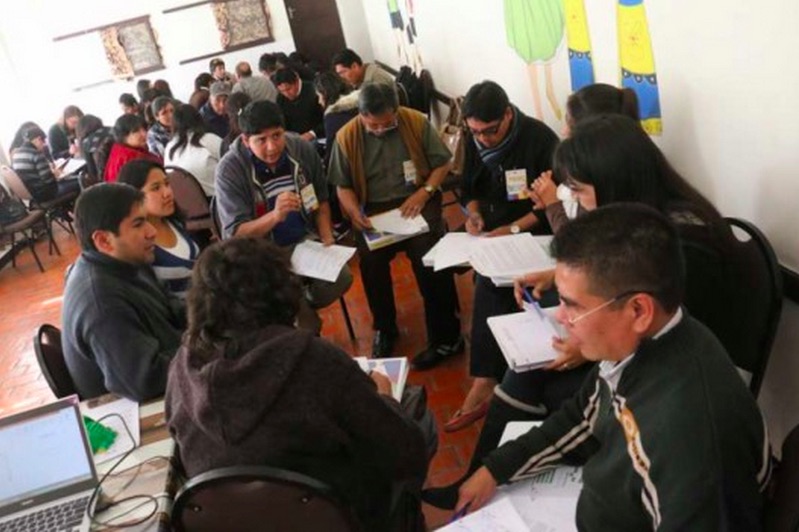Bolivia: Mediators Are Formed In Culture of Peace
CONFLICT RESOLUTION - MEDIATION, LATIN AMERICA AND THE CARIBBEAN, 3 Aug 2015
Henry A. Aira Gutiérrez, Correo del Sur - Culture of Peace News Network
July 22, 2015 – Culture of peace and conflict resolution are new phrases that Bolivians can use to avoid going to court. With the implementation of the new moral codes as of August 6, it is also the expression of the mediators, whose job is to reduce the caseload in the courts for civil and commercial matters. After selection by the Judicial Council, the mediators train for a period of 20 days.
In four classrooms at Casa Tréveris, over 150 mediators receive theoretical training and practice in the functions that will serve beginning next month.
“The intensive course is organized into four modules: the first related to justice and human rights, the second dedicated to the culture of peace, conflict theory as a basis for negotiation and conciliation; the third communication and conciliation; and the fourth refers to the process of reconciliation taking into account the principles, models and phases of the facilitative model,” according to Antonio Aramayo, executive director of the UNIR Foundation, the institution in charge of the mediation training.
The new officers are trained in the instruments that will need to apply when they are to reconcile conflicts when the new Codes Morales take effect in August.
The Judiciary Act indicates that the mediation is “the means of conflict resolution and immediate direct access to justice as well as the first procedural action”. In other words, the judicial mediation aims not only to expand access to justice but to introduce the culture of peace and peaceful methods of settling conflicts to shared solutions.
“The culture of peace is a breakthrough in the country and now we are implementing the new codes in practice for the resolution of disputes through conciliation. This is good, creating a culture of peace and a country not of confrontation, but of rapid resolution of conflicts,” said Patricia Yufra, from the mediation district of Quillacollo (Cochabamba).
“We are learning how to reconcile, to look beyond the law, to analyze problems so that they (people in conflict) can resolve their conflicts and disputes peacefully and maintain their human relationships,” said Erick Suarez, Santa Cruz conciliator.
These two professional lawyers are, like many others, being trained and expected to return to their districts on August 7 to start their work.
__________________________________
Click Here for the French Version and Here for the Spanish Version
Translation by CPNN-Culture of Peace News Network
The Culture of Peace News Network (CPNN) is a project of the Global Movement for a Culture of Peace, initiated by the United Nations, where readers exchange information about events, experiences, books, music, and web news that promote a culture of peace. CPNN is owned and managed by the Culture of Peace Corporation, based in Connecticut (USA) and composed of youth teams, including:
– those who edited the World Civil Society Report for the United Nations Decade on the Culture of Peace
– those who trained as reporters at the International Leadership Training Programme at Dynamo Camp, Italy,
– as well as other youth who have worked as reporters on CPNN and/or worked on the Youth Solidarity Fund of the United Nations Alliance of Civilizations.
The founder and president of the Corporation is David Adams, who initiated CPNN at UNESCO during the 1990s (see his blog).
Go to Original – cpnn-world.org
DISCLAIMER: The statements, views and opinions expressed in pieces republished here are solely those of the authors and do not necessarily represent those of TMS. In accordance with title 17 U.S.C. section 107, this material is distributed without profit to those who have expressed a prior interest in receiving the included information for research and educational purposes. TMS has no affiliation whatsoever with the originator of this article nor is TMS endorsed or sponsored by the originator. “GO TO ORIGINAL” links are provided as a convenience to our readers and allow for verification of authenticity. However, as originating pages are often updated by their originating host sites, the versions posted may not match the versions our readers view when clicking the “GO TO ORIGINAL” links. This site contains copyrighted material the use of which has not always been specifically authorized by the copyright owner. We are making such material available in our efforts to advance understanding of environmental, political, human rights, economic, democracy, scientific, and social justice issues, etc. We believe this constitutes a ‘fair use’ of any such copyrighted material as provided for in section 107 of the US Copyright Law. In accordance with Title 17 U.S.C. Section 107, the material on this site is distributed without profit to those who have expressed a prior interest in receiving the included information for research and educational purposes. For more information go to: http://www.law.cornell.edu/uscode/17/107.shtml. If you wish to use copyrighted material from this site for purposes of your own that go beyond ‘fair use’, you must obtain permission from the copyright owner.
Read more
Click here to go to the current weekly digest or pick another article:
CONFLICT RESOLUTION - MEDIATION:
- Negotiating a Lasting Peace in Ukraine
- Israeli Government Approves Hostage/Ceasefire Deal, to Take Effect Sun 19 Jan
- The Gaza Ceasefire Agreement: Key Points and Steps Toward Reconstruction
LATIN AMERICA AND THE CARIBBEAN:
